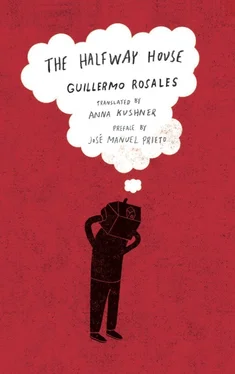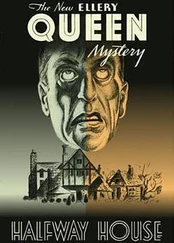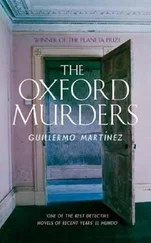“Never mind,” I say. “I’ll call again tomorrow.”
“Your books are here.” Arsenio says. “The policeman brought them. Mafia, I’m telling you this man to man, you know why you went nuts? From reading.”
“Never mind,” I say. “Keep hoping number 38 comes up.”
“Sure thing,” says Arsenio. “You’ll see me around Miami. You’ll see me!”
“Talk to you later,” I say.
“Later,” Arsenio says.
As soon as I hang up, from the main hall I hear someone yelling my name. I go there. A man in a white coat is waiting for me.
“Are you William Figueras?”
“I am.”
“Come inside. I want to talk to you. I am Dr. Paredes.”
I walk into a small windowless office. There’s a desk and three chairs. The walls are decorated with pictures of the writer Ernest Hemingway.
“Are you a fan of Hemingway?” I ask, taking a seat.
“I’ve read him,” Dr. Paredes says. “A lot.” “Have you read Islands in the Stream ?”
“Yes,” he says. “Have you read Death in the Afternoon ?”
“No,” I say, “but I read A Moveable Feast .”
“Excellent,” the doctor says. “Maybe now we’ll understand each other better. All right, William, what happened to you?”
“I wanted to be free again,” I say. “I wanted to escape the home where I was living and start a new life.”
“You took a girl with you?”
“Yes,” I say. “Frances, my future wife. She was coming with me.”
“The policeman said you were abducting her.”
“The policeman is lying,” I say. “He’s just repeating what he heard from Mr. Curbelo, the owner of the home. That woman and I love each other.”
“Love love?” Dr. Paredes asks.
“Love,” I say. “Maybe it wasn’t a great love yet. But it was blossoming.”
“Do you hear voices, William?”
“I used to,” I say. “I don’t hear them anymore.” “Do you have visions?”
“I used to. I don’t see them anymore.”
“What cured you?”
“Frances,” I say. “Having her by my side made me a new man.”
“If what you’re saying is true, I’ll help you.” Dr. Paredes says. “You’ll spend a few days here and I will personally try to fix this problem. I’ll talk to Curbelo.”
“Do you know him?”
“Yes.”
“What do you think of him?”
“He’s a businessman. Nothing more than a businessman.”
“Exactly,” I say. “And a son of a bitch, besides.”
“Okay,” Dr. Paredes says to me, “now you can go. We’ll speak again tomorrow.”
“Do you have a cigarette?”
“Yes,” he says. “Keep the pack.”
He hands me a full pack of Winstons. I pocket it. I leave the office. I go back to the room with the other nuts. I arrive at the exact moment that the man who was reciting Zarathustra has trapped a black woman in a corner and has begun to lift her dress forcefully. The woman tries to slap him away. The Zarathustra guy throws the woman to the floor and starts to touch her thighs and her sex. While he’s doing it, he says with a voice from beyond the grave:
I have walked through valleys and mountains.
And I have had the world at my feet.
O man who atoneth: suffer!
O man believeth: have faith!
O rebellious man: attack and kill!
I leave and head toward the room with the iron beds. I get to one of these beds and let myself fall on it. I think of Frances. I remember her next to me, in the entryway of that Baptist church, her shoulder pressing into my ribs.
“My angel … were you ever a communist?”
"Yes."
“Me too. In the beginning. In the beginning. In the beginning …”
I fall asleep. I dream that Frances and I run away at full speed through a field of vegetables. All of a sudden, we see headlights in the distance. It’s Curbelo’s car. We drop to the ground so he won’t see us. Curbelo drives the car through the sown vegetables. He stops next to us. He pretends not to see us. Frances and I are holding hands, almost melting into the earth. Curbelo gets out of the car with his large speargun. He stands over me with his frog legs.
“Two sturgeons!” he yells loudly. “Two huge sturgeons! This time I’ll definitely win first place! The gold cup will be mine! Mine!”
Frances and I bite the dirt beneath his feet.
I spent seven days at the state hospital. I called the halfway house one more time, but Arsenio answered again with the news that Frances remained unconscious in her bed. I couldn’t call anymore. I ran out of change. I also ran out of cigarettes.
On the seventh day, Dr. Paredes called me into his office again.
“I have something,” he says.
He takes out a poster of Hemingway and gives it to me.
“Is it a gift?”
“Yes, so you have a little faith in life.”
“Okay,” I say. “What wall will I hang it on?”
“Don’t worry,” he says. “Maybe you can hang it in that clean, well-lighted room where you wanted to move.”
“Will Frances come too?”
“We’ll have to see about that,” he says. “Now you and I are going to talk to Mr. Curbelo. If the girl wants to go with you, no one can prevent her.”
“I’m glad,” I say.
“This is a free country,” Paredes says.
“I believe you,” I say.
I look at the Hemingway poster. It’s a sad Hemingway. I tell Paredes this.
“He was already a sick man,” he says. “That was one of the last photos they took of him before he died.”
“He wanted to be a god,” I say.
“And he almost got there,” says Paredes.
He stands up. He goes over to the office door and opens it.
“Let’s go,” he says. “Let’s go to the halfway house.”
I walk out after him. We walk together down the long hallway. Paredes stops in front of the large entry door and opens it with his key.
“Let’s go,” he says.
We go out to the lobby, cross it, and walk toward the hospital parking lot.
“I’m doing this for you,” Paredes says. “I don’t think I’ve ever done this for anyone.”
“Oh, let’s go!” I say. “Have you read The Short Happy Life of Frances McComber ?”
“Yes. It’s very good. Have you read The Mother of an Ace ?”
“I don’t like it as much. I prefer The Revolutionary .”
“I’m doing this for you,” Paredes laughs. “Because in this damned city, I don’t think anyone has read Hemingway the way you have.”
We get to a small car. Paredes opens the passenger door. I get in.
“I wanted to be a writer,” Paredes says, turning on the car. “I’d still like to be one!”
We head toward the boarding home. On the way, Paredes takes a typed sheet of paper out of the glove compartment and hands it to me.
“I wrote this yesterday,” he says. “Let’s see what you think of it.”
It’s a vignette. It’s about an old butler who has spent fifty years in a man’s service. When the man dies, the butler goes up to the cadaver, contemplates it silently for a long time and spits in its face. Then he cleans the spit, covers the dead man’s face with a sheet again, and leaves, dragging his feet.
“It’s very good,” I say.
“I’m glad you like it,” he says.
We cross the city, heading west. We get to Flagler Street again and turn left, toward downtown. A few more blocks and we’re there.
“Does Curbelo know we’re coming?” I ask the doctor.
“Yes. He’s waiting for us.”
We get out of the car. Right away, all of the nuts who were sitting on the porch’s wooden chairs descend upon us, asking for cigarettes. Paredes takes out a pack of Winstons and gives it to them. We go inside. Curbelo is seated at his desk.
Читать дальше












